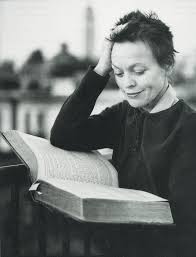 Laurie Anderson is spooky. She has a voice like no other. Droll, observant and detached, it spurns emotive expression. Her lyrics flirt with the sparse detail of haiku composition. Then there are the other voices. Electronic modulation wasn't her invention, Annette Peacock, for instance, plugged into an abrasive amp-throat chaos in the early 70s. But Anderson made it her own; warped narrative commentary and distracting aural semblances disturbing any conventional centrality. Her debut, 'Big Science,' still sounds striking and dead-on. Much of it has a bone-chilling clarity, seeming to pre-figure post-9/11 technological paranoia, delicate prophecies conceived with mantric precision and mathematical beauty. None of the albums she's made since have been quite so startling.
Laurie Anderson is spooky. She has a voice like no other. Droll, observant and detached, it spurns emotive expression. Her lyrics flirt with the sparse detail of haiku composition. Then there are the other voices. Electronic modulation wasn't her invention, Annette Peacock, for instance, plugged into an abrasive amp-throat chaos in the early 70s. But Anderson made it her own; warped narrative commentary and distracting aural semblances disturbing any conventional centrality. Her debut, 'Big Science,' still sounds striking and dead-on. Much of it has a bone-chilling clarity, seeming to pre-figure post-9/11 technological paranoia, delicate prophecies conceived with mantric precision and mathematical beauty. None of the albums she's made since have been quite so startling.
'Homeland' is co-produced by her hubby Lou Reed. She's had a profound influence on his work this century, as he's shunned songwriting to become a fully-fledged avant-garde experimenter. Anderson sticks to what she knows. Her calm, suggestive texts are backed up yet again by typical, art installation atmospherics. 'Only An Expert' deviates, it's an odd satire on our current cultural and political crisis set to some Ph.D. funkiness. But patience is rewarded in the pure, menacing brilliance of 'Another Day In America.' On this unsettling, darkly comic monologue, she affects the sort of treated, disfigured voice familiar from real crime television shows, in which the speaker's identity is deliberately masked and disguised. Broken poignancy creeped out by the inhumane. Here is an extract:
'There was an old married couple and they'd always hated each other. Never been able to stand the sight of each other, really. And when they were in their 90s they finally got divorced. And people said. 'Why did you wait so long, why didn't you do this a whole lot earlier?' And they said. 'Well, we wanted to wait until the children died.'
The lonely, morbid wisdom of everyday malice.